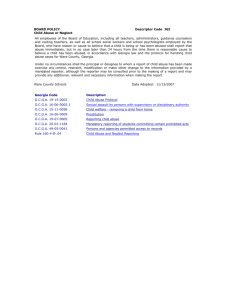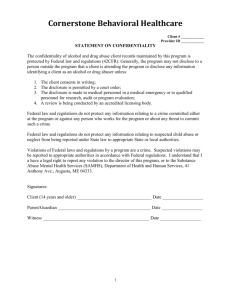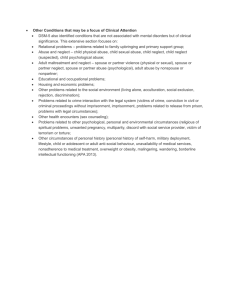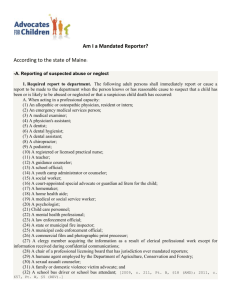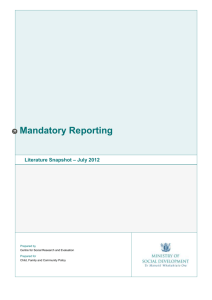Valuable lessons from Aussie system of mandatory reporting
advertisement
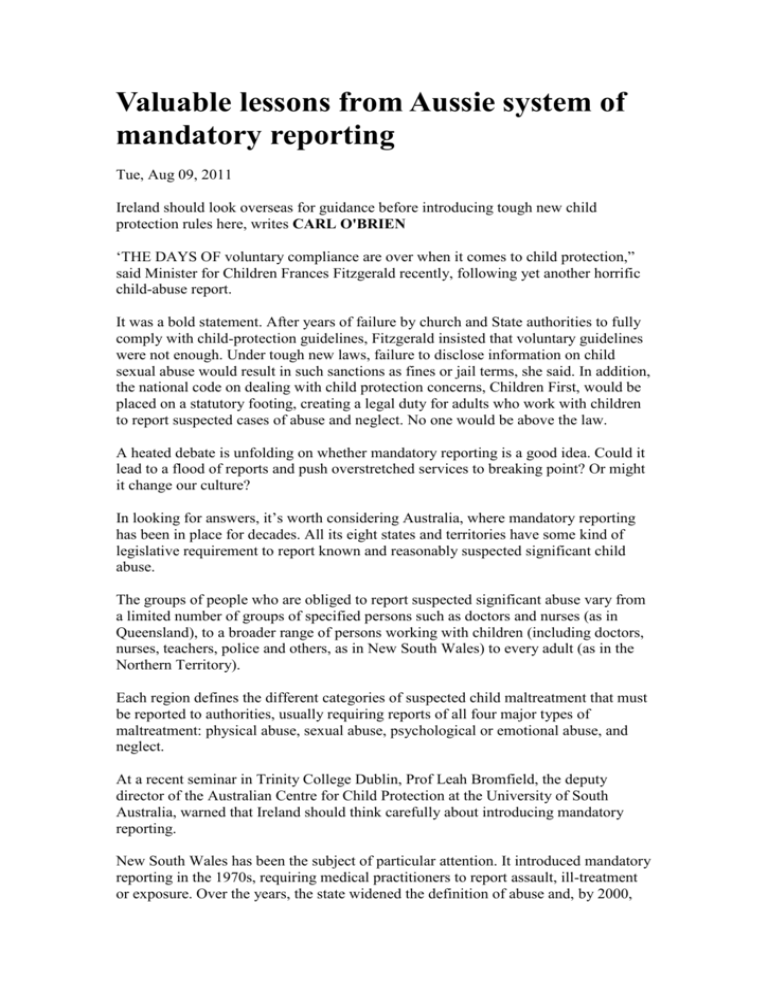
Valuable lessons from Aussie system of mandatory reporting Tue, Aug 09, 2011 Ireland should look overseas for guidance before introducing tough new child protection rules here, writes CARL O'BRIEN ‘THE DAYS OF voluntary compliance are over when it comes to child protection,” said Minister for Children Frances Fitzgerald recently, following yet another horrific child-abuse report. It was a bold statement. After years of failure by church and State authorities to fully comply with child-protection guidelines, Fitzgerald insisted that voluntary guidelines were not enough. Under tough new laws, failure to disclose information on child sexual abuse would result in such sanctions as fines or jail terms, she said. In addition, the national code on dealing with child protection concerns, Children First, would be placed on a statutory footing, creating a legal duty for adults who work with children to report suspected cases of abuse and neglect. No one would be above the law. A heated debate is unfolding on whether mandatory reporting is a good idea. Could it lead to a flood of reports and push overstretched services to breaking point? Or might it change our culture? In looking for answers, it’s worth considering Australia, where mandatory reporting has been in place for decades. All its eight states and territories have some kind of legislative requirement to report known and reasonably suspected significant child abuse. The groups of people who are obliged to report suspected significant abuse vary from a limited number of groups of specified persons such as doctors and nurses (as in Queensland), to a broader range of persons working with children (including doctors, nurses, teachers, police and others, as in New South Wales) to every adult (as in the Northern Territory). Each region defines the different categories of suspected child maltreatment that must be reported to authorities, usually requiring reports of all four major types of maltreatment: physical abuse, sexual abuse, psychological or emotional abuse, and neglect. At a recent seminar in Trinity College Dublin, Prof Leah Bromfield, the deputy director of the Australian Centre for Child Protection at the University of South Australia, warned that Ireland should think carefully about introducing mandatory reporting. New South Wales has been the subject of particular attention. It introduced mandatory reporting in the 1970s, requiring medical practitioners to report assault, ill-treatment or exposure. Over the years, the state widened the definition of abuse and, by 2000, reporting duties extended to exposure to domestic violence, where the child is at risk of serious harm. Within several years, the rate of reporting had risen six-fold, overwhelming the child protection system. Fearful of being prosecuted, professionals were overloading the system with reports of suspected abuse or neglect. Only an eighth of reports were confirmed as abuse, but resources were being swallowed up trying to cope with the reports, at the cost of the kind of less formal social work, such as family support, that could help children. In the end, the horrific deaths of two children, who had been known to social services, prompted a review of the child protection Services. The Wood Inquiry’s recommendations led to the introduction of a system to help filter tens of thousands of calls to the department and allow social services to focus on those children in most serious danger. The remainder of calls would be diverted to community services. Dr Ben Mathews, associate professor at the School of Law at Queensland University of Technology, says he fully endorses a legislative duty to report significant abuse, but says such a system needs to be carefully designed and much depends on the “prudent and clear drafting of legislation”. Of vital importance, he says, is making clear to reporters what extent of abuse needs to be reported, rather than simply extending the reporting duties and leaving them vague and ill-defined. In addition, mandatory reporting should be supplemented by expert multidisciplinary training for those mandated to report abuse concerns. This means these individuals gain vital knowledge about the indicators of mistreatment, how to deal appropriately with disclosures or suspicions of abuse, and the true nature of their reporting duty. In the case of New South Wales, he says it is too simple to describe the problem there as a case of “laws causing a flood of overreports”. The data show that much of the increase in reports was from the police. The Wood Inquiry showed that much of the so-called “over-reporting” was due to multiple reports about the same group of children. For example, in 2006-2007, more than half of all reports concerned a fifth of the children involved in all reports. “The Wood Inquiry expressly rejected the claim that the laws cause intolerable overreporting and rejected the argument that the laws should be abolished,” Mathews says. The inquiry observed that the number of children who were the subject of a report for the first time had fallen every year since 2001/02. The inquiry concluded that rather than abolishing reporting laws, the system needed greater effectiveness in reporting (including better training of reporters) and more appropriate treatment of reports.Two major recommendations of the Wood Inquiry were to limit the legislative reporting duty to cases of suspected significant harm, and to implement a greater focus on the referral of more minor cases to community-based services. These are lessons of major relevance to our Government as it begins to draw up its own plans for mandatory reporting, he says. “Government data from the US, Canada and Australia consistently shows that reports by mandated reporters make a massive contribution to protecting children from severe abuse, neglect [and death]. This applies especially to younger children, who are the most vulnerable of all.” © 2011 The Irish Times


